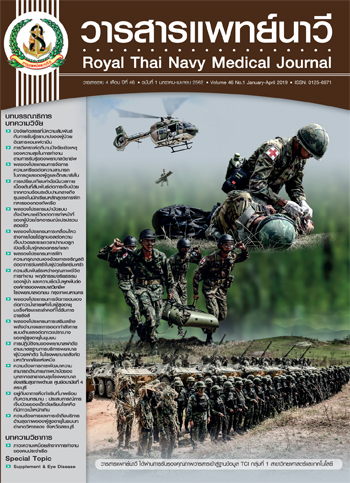A Meta-analysis of Antecedent Variables of Work Happiness as Perceived by Professional Nurses
Main Article Content
Abstract
This research synthesis aimed to 1) study research characteristics; 2) compare the means of correlation coefficients and 3) analyze the effect size of the antecedent variables of nurses’ work happiness by using the meta-analysis technique. A total of 25 Thai studies conducted during 2003 - 2016 were selected for the research. In all 41 correlation coefficients were analyzed by using the meta-analysis method of Glass, McGaw, and Smith. The statistic used in this study was a random-effects model.
The major findings were as follows:
1) The majority of the studies were master’s degree thesis dissertations published by Chulalongkorn University in the field of nursing administration (36%) in 2008 - 2012 (52%). All studies recruited registered nurses as the sample (100%), while most of the studies (60%) employed Manion’s Work Happiness Theory as a theoretical framework. Sixty-four percent of studies were based on correlation and predictive research designs. The majority of sample group was selected by multi-stage sampling (52%). All Cronbach’s alpha coefficients were tested for the reliability (100%). Most research quality was rated at high to higher levels (96%).
2) Reliability of research instrument and method of validity were statistically and significantly affected in terms of the mean correlation coefficients of nurses’ work happiness at .05.
3) The findings of the meta-analysis showed the antecedent that correlated with work happiness at .05 statistical significant level. These antecedents can be divided into the following 4 groups in order of effect size as follows: working factors (r = .664), organizational factors (r= .655), personal factors (r = .588), and management factors (r = .541), respectively.
Article Details

This work is licensed under a Creative Commons Attribution-NonCommercial-NoDerivatives 4.0 International License.
References
2.Warr P. Work happiness and unhappiness. New Jersey: Lawrence Erlbaum Associates; 2007.
3.Lakkamjohn N. How to make happiness?. PRD Magazine 2005;9(102):15-6. (in Thai).
4.Chirawatkul S, Songwathana P, Rungreangkulkij S, Fongkhew W, Deoisres W, Sindhu S, et al. Happiness and professional attachment amongst Thai registered nurses. Thai Journal of Nursing Council 2012;27(4):26-42. (in Thai).
5.Sawaengdee K. The study of the supply of professional nurses in Thailand. Nonthaburi: Department of Medical Services; 2008. (in Thai).
6.Ministry of Public Health. Healthy people, happy staff, sustainable health system, position, vision, mission, values, goals and strategies of Ministry of Public Health. [Internet]. [cited 2017 June 5]. Available from: https://bps.moph.go.th/new_bps/sites/ default/files/Positioning_MoPH_2559.pdf. (in Thai).
7.Thailand Nursing and Midwifery Council. Health and health problems of professional nurses in Thailand. [Internet]. [cited 2015 September 30]. Available from: https://www.tnc.or.th /content/content-530.html. (in Thai).
8.Mulkruakum R. Relationships between empowerment, work environment and work happiness of professional nurses in community hospitals, region 10. [Master’s Thesis, Faculty of Nursing]. Khon Kaen University; 2011. (in Thai).
9.Yongprawat T. Relationships between generations, magnetic work environment and happiness at work as perceived by professional nurses in Bangkok hospital. [Master’s Thesis, Faculty of Nursing]. Sukhothai Thammathirat Open University of Thailand; 2013. (in Thai).
10.Srijan A, Tridech P, Pandii W. Joy at work of registered nurses in Bumrugrad international hospital. Journal of Boromarajonani College of Nursing Bangkok 2013;29(2):44-57. (in Thai).
11.Glass GV, McGaw B, Smith ML. Meta-analysis in social research. Beverly Hills: CA Sage; 1987.
12.Kongyoo S. A meta-analysis on antecedent variables of nurses' quality of working life. [Master’s Thesis, Faculty of Nursing]. Chulalongkorn University; 2014. (in Thai).
13.Office of the Education Council, Ministry of Education. The research synthesis of Thai quality education: meta-analysis. Bangkok; Chulalongkorn University Press; 2009. (in Thai).
14.Manion J. Joy at work: creating a positive workplace. JONA 2003;33(12):652-5.
15.Oongkana K. Relationships between personal factors, self-esteem, work environment, and joy at work of staff nurses, private hospitals, Bangkok metropolis. [Master’s Thesis, Faculty of Nursing]. Chulalongkorn University; 2006. (in Thai).
16.Kacha P. Factors affecting happiness at work of professional nurses at the regional hospitals in eastern region, Thailand. [Master’s Thesis, Faculty of Nursing]. Burapha University; 2008. (in Thai).
17.Sriwong H. Relationships between work characteristics, job performance, organization climate and work happiness of emergency nurses at community hospitals in central region. [Master’s Thesis, Faculty of Nursing]. Burapha University; 2011. (in Thai).
18.Suddee L. Relationships between work motivation social support organizational commitment and work happiness of staff nurses general hospitals central region. [Master’s Thesis, Faculty of Nursing]. Chulalongkorn University; 2007. (in Thai).
19.Sirichayapong V. Happiness in work of registered nurses in inpatient department, Ramathibodi hospital. [Master’s Thesis, Faculty of Public Health]. Mahidol University; 2013. (in Thai).
20.Phengchai J. Relationships between transformational leadership of head nurses constructive organizational culture and learning organization as perceived by staff nurses in hospitals under the jurisdiction of naval medical department. Royal Thai Navy Medical Journal 2016;43(1):33-52. (in Thai).


